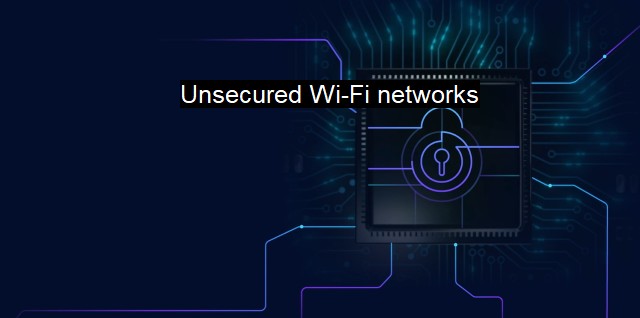What are Unsecured Wi-Fi networks?
The Risks of Using Unsecured Wi-Fi Networks: Consequences of Leaving Your Home or Public Networks Vulnerable to Hacker Attacks and Cybercrime
Unsecured Wi-Fi networks refer to wireless networks that haven't been adequately protected by cybersecurity measures, which typically involve password protection and encryption. These networks lack the necessary security protocols to protect data that is transferred through them. In the context of cybersecurity and antivirus technology, unsecured Wi-Fi networks are high-risk factors, as they are open to numerous activities that could jeopardize both personal and business quotas.Security in a digital atmosphere is critically essential to safeguard data and information traffic. Cybersecurity strides towards this objective by deploying various kinds of software applications, such as using an antivirus. Successful cybersecurity is all about integrating and customizing safety measures to protect from various threats and possible vulnerabilities.
On the broad scale of different threats in the cyber environment, unsecured Wi-Fi networks are one of the most significant sources of potential issues. The networks can be publicly accessible or personal but unprotected. As the name indicates, unsecured Wi-Fi networks lack security patches, leaving them vulnerable to malicious intrusion.
Sending data across an unsecured Wi-Fi network is akin to delivering a postcard—the content is accessible by anyone who manages to get hold of it. Individuals who use these networks run a high risk of unauthorized access to their data and devices, as cybercriminals analyze and manipulate the raw and unencrypted information flowing through the network. Transacted details like log-in credentials, personal and financial data can all be intercepted without ample difficulty.
Cybercriminals look for loopholes in cybersecurity and the easiest methods to exploit them. An unsecured Wi-Fi network is one significant lapse in cybersecurity because the connections do not undergo advanced verification. Indeed, several public Wi-Fi networks are renowned for being hotspots for cybercriminal activity. The unrestricted access to data makes it a high-known risk factor in the cybersecurity world.
The perils of unsecured Wi-Fi networks extend beyond data and identity theft, encroaching onto more complex cybersecurity threats like installing malware into the devices connected to the network, launching phishing attacks, or even utilizing the connection to distribute harmful content. Unbeknownst to the user, their device can become part of a botnet, further propagating cybercrime.
In the fight against these threats, antivirus solutions come into play. Robust antivirus software can detect and eliminate various types of malware. They also often feature internet security measures such as malicious site blockers, email protection, and alerts on public Wi-Fi networks, many of which can intervene when a device is about to connect to an unsecured network.
To strengthen Wi-Fi security, it's recommended to use strong, unique passwords and enable network encryption. WPA2 or WPA3 are generally preferred over WEP, owing to their more reliable security features. Virtual Private Network (VPN) is also a potent tool to ensure that your data traffic is encrypted across the contingent, thus securing your actions on unsecured Wi-Fi networks to a large extent.
Unsecured Wi-Fi networks are cherries-on-top for cybercriminals. They provide easy access to sensitive data without worrying about encryption or password protections. The severe implications they generate call for stringent cybersecurity measures. They propagate the necessity and prime importance of antiviruses, secure internet practices, up-to-date software, and the key role each of us play in the vast universe of the internet's safety. Therefore, always maintain precautionary security practices and consider the use of antivirus software to protect your data and secure your devices. It's essential to understand the risk that comes with such obscurity.

Unsecured Wi-Fi networks FAQs
What is an unsecured Wi-Fi network?
An unsecured Wi-Fi network is a wireless network that does not have any security measures in place to protect the data transmitted over the network. This means that anyone within range of the network can potentially access and intercept sensitive information such as passwords, credit card numbers, and personal data.What are the dangers of using an unsecured Wi-Fi network?
Using an unsecured Wi-Fi network can leave you vulnerable to cyber attacks and identity theft. Hackers can easily intercept and steal any data that is transmitted over the network. This can include sensitive information such as login credentials, financial information, and personal data.How can I protect myself when using public Wi-Fi networks?
To protect yourself when using public Wi-Fi networks, always connect to secure networks with password protection. Avoid using unsecured networks, and use a virtual private network (VPN) to encrypt your traffic and prevent hackers from intercepting your data. It's also important to keep your antivirus software up to date to protect against any potential threats.What should I do if I think my information has been compromised on an unsecured Wi-Fi network?
If you suspect that your data has been compromised on an unsecured Wi-Fi network, immediately disconnect from the network and change any passwords that may have been compromised. Monitor your accounts for any suspicious activity and consider placing a fraud alert on your credit report. It's also a good idea to report the incident to the network owner or local authorities.| | A | | | B | | | C | | | D | | | E | | | F | | | G | | | H | | | I | | | J | | | K | | | L | | | M | |
| | N | | | O | | | P | | | Q | | | R | | | S | | | T | | | U | | | V | | | W | | | X | | | Y | | | Z | |
| | 1 | | | 2 | | | 3 | | | 4 | | | 7 | | | 8 | | |||||||